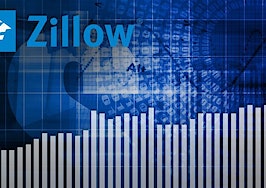Last week, Zillow announced it was going to start directly buying and selling houses. More specifically, it will actively participate in its Instant Offers Marketplace, which allows consumers to get instant offers on their homes (the iBuyer model).
Yes, buying and selling houses is a big deal for Zillow. And yes, it’s a huge shift for a marketplace. But this is really about Zillow’s core advertising business and delivering high-quality leads to agents. In this case, it’s the ultimate lead.
How much would you pay for a guaranteed lead?
In 2016, Zillow generated nearly 17 million leads for its Premier Agents. That’s more than three times the total number of annual residential transactions in the U.S. Clearly, each lead is warm at best and doesn’t always result in a transaction.
If Zillow follows through with its iBuyer plans to buy and sell houses — using agents on both sides of the transaction — it will have created the most valuable lead possible: a guaranteed buyer or seller. And that’s because the lead is Zillow itself.
When Zillow buys a house, it is the buyer, and it can effectively sell that guaranteed lead to a Premier Agent to represent itself. A few months later when Zillow flips and sells the house, it is the seller, and it can sell that guaranteed lead to its Premier Agent partners. And it can sell these leads for many multiples more than it currently sells buyer leads.
The current cost per lead on Zillow varies wildly by market, but is generally between $20 and $220 per lead. It looks like the average is around $100 per lead. The most expensive is $220 per lead in the hottest and most expensive ZIP code in New York City.
Agent lead referral businesses — like HomeLight in the U.S. and OpenAgent in Australia — typically charge agents a 20 percent to 25 percent commission as a referral fee if the transaction closes.
In other words, if an agent gets a lead and closes the transaction, they pay out one-fourth of their commission. For an average-priced home in the U.S. ($250,000) that equates to $1,875.
Using the same logic, if Zillow is able to sell a guaranteed lead to its Premier Agents, it could charge $1,875 per lead — an 18-times improvement over an average of $100 per lead.

If you’re a real estate agent, would you pay $1,875 to make $7,500 (a 3 percent commission on a $250,000 home)? I would. In fact, I’d probably pay more.
Potential revenue pools
Zillow says it’s aiming to buy and sell between 300-1,000 houses this year. If Zillow completes 1,000 transactions and charges an average of $1,875 per lead on both the buy and sell side (representing Zillow as the buyer and then the seller), that’s $3.75 million in revenue. Not a very big number compared to the $905 million in Premier Agent revenue Zillow is projecting for the year.

But let’s scale; 1,000 houses is small potatoes. Opendoor is currently buying around 1,000 houses per month. If Zillow were able to match that volume, that’s $45 million in annual revenue.
And remember, that’s at a 25 percent fee. Agents would likely pay more in a bidding system. If Zillow could capture 50 percent of the commission at the same volume, that’s $90 million in revenue.

Able to charge consumers, too
But that’s not the only way Zillow can make money; it can charge homesellers a fee for the Instant Offers service (in the same way the other iBuyers do). Assuming Zillow charges a 2 percent fee to homesellers (on top of the 6 percent in typical agent commissions), it would make $5 million in revenue on 1,000 transactions (assuming an average home price of $250,000).
If Zillow scales up to Opendoor’s volume levels (1,000 transactions per month), that’s $60 million in annual revenue.
None of these revenue sources are open to Zillow if it operates an Instant Offers marketplace; it needs to be part of the transaction to generate high-quality leads and charge consumers directly.
Strategic implications
This has been a fun exercise, and I’ve made a ton of assumptions. But the goal is to illustrate the opportunity in front of Zillow and expose some of the (assumed) strategic rationale for this shift — something a lot of people are completely missing.
If Zillow pulls this off, it will have managed to create the ultimate, guaranteed real estate lead.
I’ve written a lot about iBuyers, and this note just scratches the surface. Check out the following if you’re interested in learning more:
- Inside Opendoor: what two years of transactions say about their prospects (most comprehensive analysis)
- The Opendoor Paradox: A Strategic Analysis (most recent)
- The Opendoor Machine: 4 numbers you need to know
- iBuyer Market Update: Opendoor and OfferPad in Phoenix
- Growth in new markets: An analysis of Opendoor, Knock, and OfferPad
Mike DelPrete is a strategic adviser and global expert in real estate tech. Connect with him on LinkedIn.









